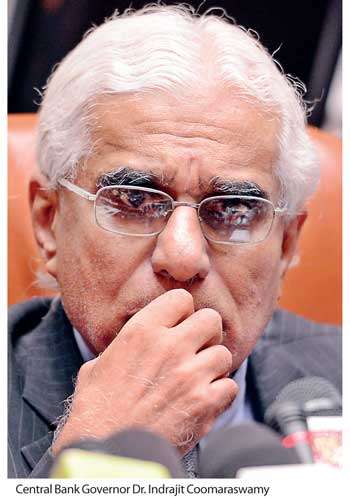Reply To:
Name - Reply Comment
The Central Bank yesterday hit back at Moody’s Investors Service over the recent credit rating downgrade, stating that the rating agency’s decision is unwarranted and unjustifiable as it is purely based on heightened political uncertainty, with no evidence of slippages in macroeconomic policies.
Issuing a media communiqué, the Central Bank emphasised that Sri Lanka’s current level of Gross Official Reserves (GOR) amounting to US$ 7.2 billion is sufficient for the country to meet its external debt obligations in the period ahead.

“In order to meet the government’s external liabilities of International Sovereign Bond (ISB) maturities of US$ 1 billion in January 2019 and US$ 500 million in April 2019, the authorities have already built a buffer fund from proceeds of the divestment of Hambantota port and the syndicated loan of China Development Bank (CDB),” the Central Bank said.
Delivering the first major blow to the crisis-ridden Sri Lanka’s economy, Moody’s Investors Service on Tuesday downgraded the Government of Sri Lanka’s foreign currency issuer and senior unsecured ratings to B2 from B1 and changed the outlook to ‘Stable’ from ‘Negative’.
Citing reasons for the downgrade, Moody’s said the current political turmoil in Sri Lanka has exacerbated the country’s debt refinancing risks amid the tightening of external and domestic financing conditions and low foreign reserve adequacy.
However, the Central Bank reiterated that Sri Lanka’s macroeconomic position has neither deteriorated nor has there been any policy slippage since Moody’s last rating decision in July 2018, in spite of the recent developments in the country’s political sphere.
The Central Bank noted that as a precautionary measure, the bank has already initiated negotiations with central banks of friendly nations with regard to obtaining foreign currency swap facilities of sizable amounts.
Elaborating its plans to strengthen buffers to meet impending external debt obligations, the Central Bank stated: “The issuance of Sri Lanka Development Bonds (SLDBs) of around US$ 750 million to US$ 1 billion during the remainder of the year and in early 2019 is now at an advanced stage of completion.
These investments would be sourced through enhanced credit lines for State banks from the Middle East and East Asia, together with remittance and tourism related inflows.
In addition, the US$ 500 million enhancement, in February 2019, to the syndicated loan obtained from China Development Bank is also on track. This means that by February 2019 more than US$ 2 billion will be mobilized. This would more than cover all the ISB payments due in 2019.
In addition, the buffer can be further built up through US$600 million expected as disbursements from bilateral and multilateral agencies during next year.”
Despite International Monetary Fund (IMF)’s Extended Fund Facility (EFF) programme currently being put on hold over pending clarity on the political situation, the Central Bank stressed that the Sri Lankan authorities and the IMF reached staff-level agreement following the fifth review of the EFF programme on October 26, 2018, which was to be announced on October 29th.
The Central Bank expects that the fiscal and macro prudential measures that are already in place will result in an improvement in the external trade balance, thus reducing pressure on external reserves and the exchange rate.
However, Moody’s stated that even if the current political crisis is resolved quickly, it has heightened refinancing risks beyond levels anticipated when the rating agency affirmed the rating at B1 with a ‘Negative’ outlook in July.
Moody’s expects Sri Lanka’s debt refinancing to remain highly vulnerable to sudden shifts in investor sentiment in a period of further tightening in financing conditions and political and policy uncertainty, with limited buffers to face such risks.
Moody’s also warned that the rating agency would consider further downgrading of Sri Lanka’s rating if external and domestic financing conditions were to deteriorate further than expected.